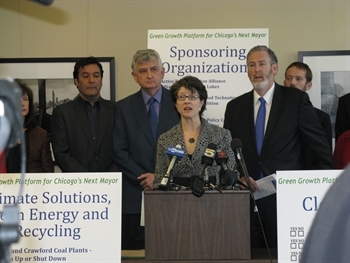The race for Chicago’s new mayor is in full swing, and MPC is offering ideas and assistance to all the candidates, helping ensure issues affecting all Chicagoans are in the mix.
Before the holidays, we joined with seven other organizations to release the Sustainable Transportation Platform. The platform focuses on 10 key transportation priorities – including infrastructure improvements and financing mechanisms – to support a world-class transportation network that is both economically and environmentally sustainable. Most of the recommendations are under the purview of the mayor; some recommendations require cooperation with regional and state agencies. Download the complete Sustainable Transportation Platform from Active Transportation Alliance’s web site.
Today, we joined with a group of 18 Chicago organizations in presenting the Green Growth Platform, with 20 questions to mayoral candidates that address key environmental issues, including Chicago’s climate change solutions and clean energy future, recycling, clean water, transportation and mobility, and parks, open space and public land. The Green Growth Platform is available on the Environmental Law and Policy Center's web site.

Here I am, speaking at the Green Growth Platform release, flanked by (from left) Erma Tranter of Friends of the Parks, MPC's Peter Skosey, Mike Nowak of the Chicago Recycling Coalition, and Howard Learner of ELPC.
Photo by Jill Geiger
I was asked to speak at the Green Growth Platform press conference, highlighting transportation issues related to the environment. Here’s what I had to say:
In the global economy, “green” and “competitive” go hand-in-hand. Perhaps in no industry is that connection more clear than in the transportation sector.
A great example is the Englewood Flyover, a $133 million investment to separate road and freight traffic at 63rd and State streets on the South Side. In one project, the region is easing commutes for some 30,000 drivers, giving others better access to Metra, keeping goods moving to support our economy, and reducing exhaust from idling cars.
Clearly, transportation innovation can help Chicago’s next mayor on many fronts. Transportation is not only about connecting people and goods to their destinations. It is also a way to generate economic development, encourage healthy lifestyles, and reduce Chicago’s carbon footprint.
The Green Growth Platform builds on the backbone of a green transportation network – and a green city – transit.
CTA is $6.8 billion short on capital funding over the next five years. We must increase funding to repair CTA lines and green our fleet of busses. We also need to get the most bang for our buck with new, cost-effective systems, such as the bus rapid transit route recently announced for the Western Corridor.
Along with high-speed rail, transit will attract new shops, jobs, companies, and even industries to our city.
We must move on neighborhood improvements that give people the choice to walk or bike. Not everyone will make that choice, but those who do will reduce their waistlines – and household transportation expenses. Ideally, the combined cost of housing and transportation is less than 45 percent of household expenses; in metropolitan Chicago, 51 percent of households pay more than that, according to the Center for Neighborhood Technology’s Housing + Transportation Index.
And for those who must drive, let’s offer more options that reduce congestion and pollution, such as car sharing and electric vehicles.
It’s no coincidence that Chicago has ranked near the top of both global cities and green cities lists. To ensure Chicago is a player in the next economy, the next mayor must think green – and transportation innovation is one of the surest ways to get there.
I ride the CTA to and from my office every day, part of the system’s nearly 2 million daily rides. We need the next mayor to get on board with the needs of transit users and modernize and expand this system that is truly the backbone of Chicago’s transportation network.
Stay tuned: Results from the survey will be released on Jan. 13 and posted on MPC's web site. Also, circle Jan. 19 on your calendar: At the “Mayoral Forum on Community and Environmental Issues,” moderated by Andy Shaw, executive director, Better Government Association, candidates will have the opportunity to weigh in on environmental issues and community concerns. Tickets to the forum are not yet available, but it will take place from 7 to 9 p.m. at the Chicago Marriott Downtown, 540 N. Michigan Ave. To be added to the waiting list, email Meshawn Ayala.